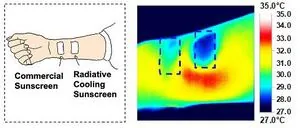
Revolutionary Sunscreen Prototype Cools Your Skin While Protecting You from UV Rays!
2024-12-19
Author: Siti
Groundbreaking Sunscreen Development
A groundbreaking new sunscreen prototype has been developed that not only shields your skin from harmful UV radiation but also keeps you cool under the sun. According to a recent study published in ACS Nano Letters, this innovative sunblock can reduce skin temperature by up to 11 degrees Fahrenheit (6 degrees Celsius) compared to bare skin, making it significantly cooler than typical sunscreens available on the market.
Leveraging Radiative Cooling Technology
This revolutionary product leverages a technology called radiative cooling, which works by either reflecting or radiating heat away from the skin. This technology has found its way into various applications, from cooling fabrics to energy-saving coatings for buildings. Traditionally, titanium dioxide (TiO2) has been the go-to ingredient in mineral sunscreens for its ability to reflect UV light. However, the standard particle size of TiO2 hasn't effectively contributed to cooling—until now.
Innovative Formula
Researcher Rufan Zhang and his team meticulously crafted this new sunscreen by fine-tuning the size of TiO2 nanoparticles to create a dual-action formula that both reflects UV rays and provides cooling relief. The final product consists of six key ingredients: TiO2 nanoparticles, water, ethanol, moisturizing cream, pigments, and polydimethylsiloxane—a silicone polymer commonly used in cosmetics.
Impressive Performance Metrics
This innovative sunscreen boasts an impressive SPF of approximately 50 and exhibits water resistance, proving its effectiveness even after 12 hours of exposure to simulated sunlight. In trials conducted in hot and humid environments, participants experienced an average skin temperature drop of 10.8°F (6.0°C) compared to bare skin and a cooling effect of up to 11°F (6.1°C) compared to standard sunscreens. What’s even more remarkable is that the formulation has shown no signs of irritation when tested on both animal and human skin.
Cost-Effectiveness and Commercial Potential
Moreover, this prototype is cost-effective, priced at just $0.92 for 10 grams, making it comparable to other sunscreens available today. The researchers are optimistic about its commercial potential, especially with the rising summer temperatures, as consumers increasingly seek products that offer both sun protection and cooling effects.

 Brasil (PT)
Brasil (PT)
 Canada (EN)
Canada (EN)
 Chile (ES)
Chile (ES)
 España (ES)
España (ES)
 France (FR)
France (FR)
 Hong Kong (EN)
Hong Kong (EN)
 Italia (IT)
Italia (IT)
 日本 (JA)
日本 (JA)
 Magyarország (HU)
Magyarország (HU)
 Norge (NO)
Norge (NO)
 Polska (PL)
Polska (PL)
 Schweiz (DE)
Schweiz (DE)
 Singapore (EN)
Singapore (EN)
 Sverige (SV)
Sverige (SV)
 Suomi (FI)
Suomi (FI)
 Türkiye (TR)
Türkiye (TR)